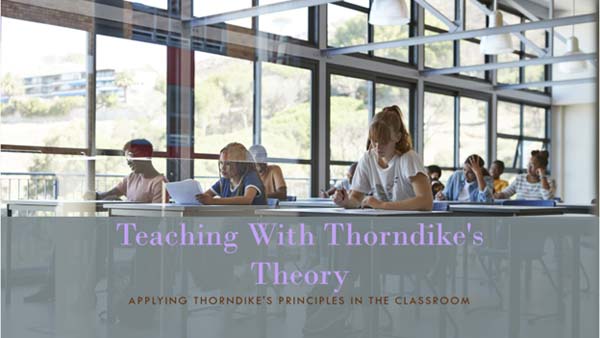Research Article
By Dr. Tarek M. ElBaba
Introduction
Edward L. Thorndike, a pioneering American psychologist, is renowned for his work in the field of educational psychology. His theories, particularly the Laws of Learning, have had a profound impact on modern educational practices. This article explores Thorndike's theory, specifically the Law of Effect, and its application in contemporary teaching methods.
Thorndike's Theory
Thorndike's primary contribution to psychology is his formulation of the Laws of Learning, which include the Law of Effect, the Law of Readiness, and the Law of Exercise. The Law of Effect posits that behaviors followed by satisfying consequences are more likely to be repeated, while those followed by unpleasant consequences are less likely to be repeated (Thorndike, 1911). This principle laid the groundwork for operant conditioning and behaviorist approaches in education.
Application in Teaching
Thorndike's theory has been instrumental in developing effective teaching strategies. Here are several ways his principles are applied in educational settings:
1. Reinforcement and Feedback: Instructors use positive reinforcement to encourage desired behaviors. For example, praising students for correct answers or good behavior increases the likelihood of these behaviors being repeated. Negative reinforcement, such as the removal of an unpleasant task when a student performs well, can also be effective (Skinner, 1953).
2 . Assessment and Adaptive Learning: Regular assessments provide feedback to students and teachers about the learning process. Immediate feedback helps students understand their mistakes and correct them, which aligns with Thorndike's emphasis on the consequences of actions (Black & Wiliam, 1998).
3 . Motivation and Engagement: Thorndike's Law of Readiness suggests that students learn best when they are ready and motivated. Teachers can enhance readiness by creating a stimulating and supportive classroom environment. Intrinsic motivation can be fostered through engaging activities that are relevant to students' interests (Deci & Ryan, 2000).
4 . Skill Mastery and Practice: The Law of Exercise, which emphasizes the importance of practice in strengthening learning, is evident in teaching methods that encourage repetition and active engagement. Techniques such as spaced repetition and practice quizzes help solidify knowledge and skills (Roediger & Butler, 2011).
Case Studies and Practical Examples
1 . Elementary Education: In a study by Jones and Jones (2013), elementary school teachers used a reward system to reinforce positive classroom behavior. The study found a significant improvement in student conduct and academic performance, demonstrating the practical application of Thorndike's Law of Effect.
2 . Technology-Enhanced Learning: The use of educational software that adapts to a student's learning pace and provides immediate feedback exemplifies Thorndike's principles. Research by Clark and Mayer (2016) shows that adaptive learning technologies improve student outcomes by providing personalized reinforcement and feedback.
Conclusion
Thorndike's theories remain relevant and influential in modern education. By understanding and applying his Laws of Learning, educators can create effective teaching strategies that enhance student engagement, motivation, and achievement. The principles of reinforcement, readiness, and practice are integral to developing successful educational practices.
References
1 . Black, P. & Wiliam, D., 1998. Assessment and Classroom Learning. Assessment in Education: Principles, Policy & Practice, 5(1), pp.7-74.
2 . Clark, R. C. & Mayer, R. E., 2016. E-Learning and the Science of Instruction: Proven Guidelines for Consumers and Designers of Multimedia Learning. 4th ed. Hoboken: Wiley.
3 . Deci, E. L. & Ryan, R. M., 2000. The "What" and "Why" of Goal Pursuits: Human Needs and the Self-Determination of Behavior. Psychological Inquiry, 11(4), pp.227-268.
4 . Jones, V. & Jones, L., 2013. Comprehensive Classroom Management: Creating Communities of Support and Solving Problems. 10th ed. Boston: Pearson.
5 . Roediger, H. L. & Butler, A. C., 2011. The Critical Role of Retrieval Practice in Long-Term Retention. Trends in Cognitive Sciences, 15(1), pp.20-27.
6 . Skinner, B. F., 1953. Science and Human Behavior. New York: Macmillan.
7 . Thorndike, E. L., 1911. Animal Intelligence: Experimental Studies. New York: Macmillan.




















